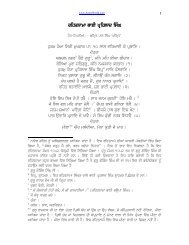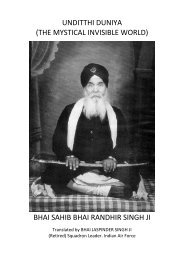Guru Gobind Singh's Death at Nanded Examination of - Vidhia.com
Guru Gobind Singh's Death at Nanded Examination of - Vidhia.com
Guru Gobind Singh's Death at Nanded Examination of - Vidhia.com
Create successful ePaper yourself
Turn your PDF publications into a flip-book with our unique Google optimized e-Paper software.
50 AN EXAMINATION OF SUCCESSION THEORIES<br />
<strong>Guru</strong>, they inquired who was to succeed him. He replied,<br />
' 'I have entrusted you to the Immortal God. Ever remain<br />
under His protection, and trust to none besides. Wherever<br />
there are five Sikhs assembled who abide by the <strong>Guru</strong>'s teachings,<br />
know th<strong>at</strong> I am in the midst <strong>of</strong> them. He who serveth<br />
them shall obtain the reward there<strong>of</strong>, the fulfilment <strong>of</strong> all his<br />
heart's desires. Read the history <strong>of</strong> your <strong>Guru</strong>s from the time<br />
ol <strong>Guru</strong> Nanak. Henceforth the <strong>Guru</strong> shall be the Kbalsa and<br />
the Khalsa the <strong>Guru</strong>. I have infused my mental and bodily<br />
spirit into the Granth Sahib and the Khalsa.'<br />
' - After this the <strong>Guru</strong> b<strong>at</strong>hed and changed his dress. He then<br />
read the Japji and repe<strong>at</strong>ed an Ardas or supplic<strong>at</strong>ion. While<br />
doing so, he gave instructions th<strong>at</strong> no clothes should be bestowed<br />
as alms in his name. He then put on a muslin waistband,<br />
slung his bow on his shoulder and took his musket in<br />
his hand. He opened the Granth Sahib and placing five<br />
paise and a coco-hut before it solemnly bowed to it as his<br />
successor. Then uttering 'Wahiguru ji ka Khalsa! Wahiguru<br />
ji ki f<strong>at</strong>eh !' he circumambul<strong>at</strong>ed the sacred volume and said,<br />
'O beloved Khalsa, let him who desireth to behold me, behold<br />
the <strong>Guru</strong> Granth. Obey the Granth Sahib. It is the visible body<br />
<strong>of</strong> the <strong>Guru</strong>. And let him who desireth to meet me diligently<br />
search its hymns.'<br />
The <strong>Guru</strong> went to an enclosure formed <strong>of</strong> tent walls where<br />
his bier had been erected. In the end <strong>of</strong> the night—a w<strong>at</strong>ch<br />
before day—he lay on his bier and directed all his Sikhs<br />
except Bhai Santokh Singh, who was specially <strong>at</strong>tached to him,<br />
to go to their homes. He then gave his last orders to his last<br />
<strong>at</strong>tendant. 'Keep my kitchen ever open, and receive <strong>of</strong>ferings<br />
for its maintenance. If any one erect a shrine in my honour,<br />
his <strong>of</strong>fspring shall perish.' Bhai Santokh Singh represented<br />
th<strong>at</strong> the Sikhs were few <strong>at</strong> Nander, and how were <strong>of</strong>ferings to<br />
be obtained ? The <strong>Guru</strong> replied, 'O Bhai Santokh Singh,<br />
have p<strong>at</strong>ience. <strong>Singh's</strong> <strong>of</strong> mine <strong>of</strong> very gre<strong>at</strong> eminence shall<br />
<strong>com</strong>e here and make copious <strong>of</strong>ferings. Everything shall be<br />
obtained by the favour <strong>of</strong> <strong>Guru</strong> Nanak.' He then, in gr<strong>at</strong>eful<br />
acknowledgement <strong>of</strong> the spiritual benefactions <strong>of</strong> the founder<br />
<strong>of</strong> his religion, uttered a Persian distich, the transl<strong>at</strong>ion <strong>of</strong><br />
which is :<br />
<strong>Gobind</strong> Singh obtained from <strong>Guru</strong> Nanak<br />
Hospitality, the sword, victory, and prompt assistance.<br />
The <strong>Guru</strong> then bre<strong>at</strong>hed his last. The Sikhs made prepar<strong>at</strong>ions<br />
for his obsequies as he had instructed them, the Sohila was<br />
GURU GOBIND SINGH S DEATH AT NANDED<br />
solemnly chanted, and sacred food distributed.<br />
While all were mournir.g the loss <strong>of</strong> the <strong>Guru</strong> a hermit<br />
arrived and said, "You suppose th<strong>at</strong> the <strong>Guru</strong> is dead. I saw<br />
him this very morning riding his bay horse. When I bowed<br />
to him he said, "Come, O hermit, let me behold thee. Very<br />
happy am I th<strong>at</strong> I have met thee <strong>at</strong> the last moment." I then<br />
asked him whither he was wending his way. He smiled and<br />
said he was going to the forest on a hunting excursion. He had<br />
his bow in his hand, and his arrows were fastened with a<br />
strap to his waist.'<br />
The Sikhs who heard this st<strong>at</strong>ement arrived <strong>at</strong> the conclusion<br />
th<strong>at</strong> it was all the <strong>Guru</strong>'s play, th<strong>at</strong> he dwelt in uninterrupted<br />
bliss, and th<strong>at</strong> he showed himself wherever he was remembered.<br />
He had merely <strong>com</strong>e into the world, they said, to make trial<br />
<strong>of</strong> their faith, and remove the ills <strong>of</strong> existence. Wherefore for<br />
such a <strong>Guru</strong> who had departed bodily to heaven, there ought<br />
to be no mourning. The ashes <strong>of</strong> his bier were collected and a<br />
pl<strong>at</strong>form built over them. The Khalsa, to whom the <strong>Guru</strong>ship<br />
had been entrusted, declared th<strong>at</strong> all those who visited the spot<br />
should receive due spiritual reward. ,<br />
The <strong>Guru</strong> departed from the scene <strong>of</strong> his earthly triumphs<br />
and reverses on Thursday, the fifth day <strong>of</strong> the bright half<br />
<strong>of</strong> Kartik, Samb<strong>at</strong> 1765 (A.D. 1708), having exercised spiritual<br />
and temporal sovereignty over the Sikhs for three and thirty<br />
years,-and resided in Nander for fourteen months and ten days,<br />
[pp. 243-46].<br />
8. GENEALOGICAL ACCOUNTS — GUR-PRANALIAN<br />
There is another class <strong>of</strong> evidence which is particularly<br />
relevant to our study here. It is known as the Gur-pranalian<br />
or genealogies <strong>of</strong> the <strong>Guru</strong>s. As they deal mainly with the<br />
parentage, births, de<strong>at</strong>hs, descendants and successors <strong>of</strong> the<br />
" <strong>Guru</strong>s, they are a very useful source <strong>of</strong> inform<strong>at</strong>ion for deter-<br />
.mining the order <strong>of</strong> succession <strong>of</strong> <strong>Guru</strong>ship. .Six <strong>of</strong> these<br />
' Gur-pranalis by Bhai Kesar Singh, Poet Sauhdha, Bhai<br />
Gulab Singh, Kavi Ram Singh, an anonymous poet and by<br />
Kavi Gulab Singh are available, and all <strong>of</strong> them, without<br />
exception, accept the de<strong>at</strong>h <strong>of</strong> <strong>Guru</strong> <strong>Gobind</strong> Singh <strong>at</strong> <strong>Nanded</strong><br />
'in 1708 as an indisputable historical fact. [Appendix XIII.J<br />
9. CLAIMS OF SCHISMATICS<br />
Signs <strong>of</strong> schism<strong>at</strong>ic tendencies had appeared in the<br />
Sikh <strong>com</strong>munity soon after" the de<strong>at</strong>h <strong>of</strong> Gum <strong>Gobind</strong> Singh<br />
51



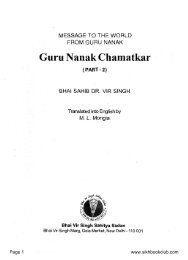
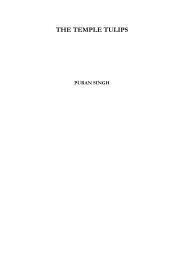
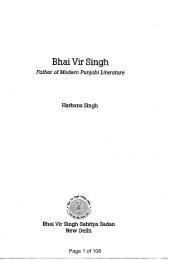

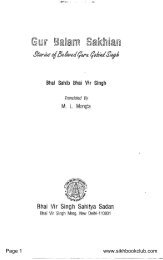
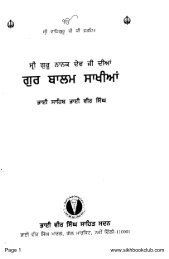
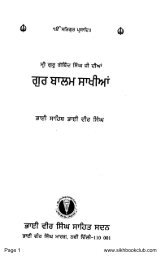
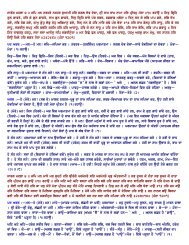
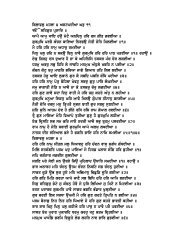
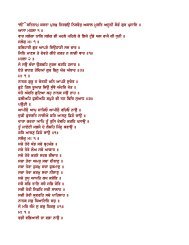
![cOpeI ] hmrI kro hwQ dY r~Cw ] pUrn hoie ic~q kI ie ... - Vidhia.com](https://img.yumpu.com/12240258/1/190x245/copei-hmri-kro-hwq-dy-rcw-purn-hoie-icq-ki-ie-vidhiacom.jpg?quality=85)
